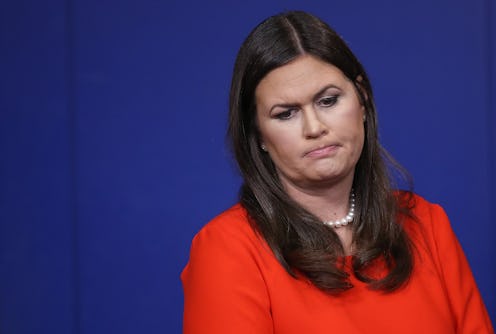News
The White House Refuses To Weigh In On Climate Change's Role In Hurricanes

After Hurricane Harvey battered Texas and Hurricane Irma clobbered parts of Florida, President Donald Trump's administration has steadfastly declined to say whether climate change intensified the hurricanes. White House adviser Tom Bossert said at a press briefing on Monday that it was too early to say whether climate change played a role, and insisted that they are taking climate change seriously, though "not the cause of it but the things that we observe." Bossert added: "Causality is something outside of my ability to analyze right now."
The environment is a thorny topic for the president, who denies the existence of the scientifically founded phenomenon known as climate change. When the White House press secretary was asked if Irma and Harvey — which have been thought to have been intensified by climate change — had caused Trump to reconsider his position, she said that he had not. “I don't think that it's changed over the last several weeks," Sarah Huckabee Sanders said.
Trump administration members have gone so far as to say that reporters' questions about the link between climate change and hurricanes were "insensitive." In an interview with CNN, Environmental Protection Agency administrator Scott Pruitt said: "To have any kind of focus on the cause and effect of the storm; versus helping people, or actually facing the effect of the storm, is misplaced." Pruitt is known for his skepticism in climate change and its effects on extreme weather occurrences.
According to scientists, hurricanes like Harvey have been more intense than they would've been previously because as climate change causes the air to warm, the top levels of the ocean absorb that heat, and that ocean heat fuels the hurricane. “This is the main fuel for the storm,” Kevin Trenberth, a senior scientist at the U.S. National Center for Atmospheric Research, told The Atlantic. “Although these storms occur naturally, the storm is apt to be more intense, maybe a bit bigger, longer-lasting, and with much heavier rainfalls [because of that ocean heat].”
Hurricane Harvey hit the Texas Gulf Coast in late August, bringing massive flooding to Houston and its surroundings. The storm made landfall near Rockport, Texas, as a Category 4 hurricane — making it the first major hurricane since 2005's Wilma to hit the U.S. At least 60 people have died due to Harvey's catastrophic damage. Together with Hurricane Irma, which hit Florida last weekend, Hurricane Harvey is predicted to have caused as much as $200 billion in damage.
Early on in his presidency, Trump made it clear that he was not interested in combatting climate change via the means put in place by his predecessor President Barack Obama. In June, Trump said that he would be withdrawing the U.S. from the landmark Paris accord, a 2016 deal between roughy 200 countries that aimed to lower emissions significantly. In August, the Trump administration officially notified the UN that the U.S. would be pulling out of the Paris climate agreement.
In his official announcement, Trump said that his decision was based on his belief that the Paris climate accord would hurt American business. “As the President indicated in his June 1 announcement and subsequently, he is open to re-engaging in the Paris Agreement if the U.S. can identify terms that are more favorable to the United States, its businesses, its workers, its people, and its taxpayers,” the State Department said at the time.
As for whether or not Trump's team will confront the fact that climate change has influenced recent extreme weather events, it remains unclear. White House adviser Bossert did say that he might conduct further research into the link between climate change and hurricanes. "We'll have to do a trend analysis at a later date," he said in response to a reporter's question about Irma and Harvey.